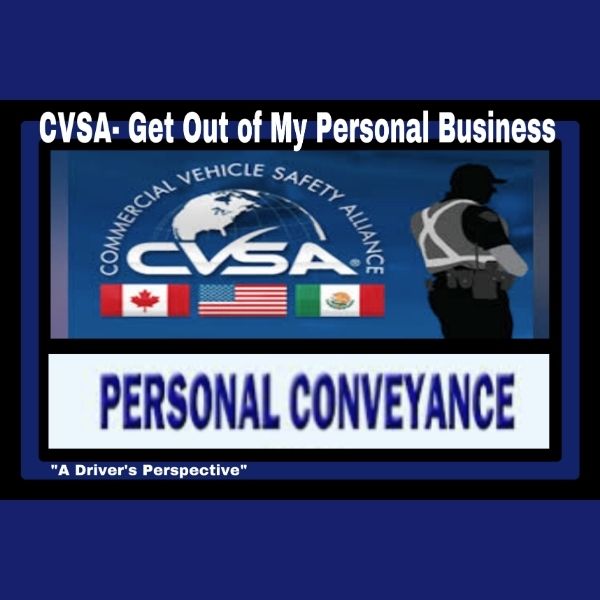
Get Out of My Business:
The Truth About CVSA’s Push to Limit Personal Conveyance
Let’s Start With the Basics
If I’m making the payments on my truck – whether it’s leased or bank-financed – the CVSA has no business telling me how I can use it when I’m off the clock.
I pay the insurance.
I pay the plates.
I pay the IFTA fuel tax, the highway use tax, the fuel itself.
If I want to climb into my truck on my personal time and drive it across the state to visit family, take a vacation, or just go for a long drive, that’s between me, my wallet, and God. Not the CVSA. Not the FMCSA. Not anybody else.
Why This Is Even a Discussion
The CVSA claims they need to put a two-hour daily cap on personal conveyance (PC) because some drivers are “cheating” – using PC to advance their loads or bypass Hours-of-Service limits.
This isn’t the first time they’ve tried it.
- 2020 – CVSA petitions FMCSA for PC limits. Denied.
- 2022 – They try again. Denied.
- May 2025 – CVSA’s board approves a formal proposal for a two-hour daily cap.
- July 29, 2025 – CVSA tells the U.S. Senate they’ve seen “40% misuse” in audits and claims some drivers use PC for up to ten hours. They say it’s a fatigue and safety risk.
- Now – They’re preparing their third petition to FMCSA.
As of August 12, 2025, the FMCSA has not changed its rules. PC still has no federal time or distance limit, so long as you’re relieved from work responsibilities and not operating for the carrier’s benefit.
Who’s Actually Behind CVSA
The CVSA isn’t a corporate lobbying group. It’s run by senior enforcement officials from state motor vehicle and highway patrol agencies:
- Capt. John Hahn – President, Colorado State Patrol
- Maj. Erick McGuire – Vice President, Florida Highway Patrol
- Sgt. William Alarcon – Secretary, New Jersey State Police
These are career enforcement professionals, not politicians. Their mission is road safety and rule enforcement – but that’s exactly why their proposals often go for broad, measurable rules instead of targeted enforcement.
The Safety Claim – and the Reality
Here’s the truth: there’s no confirmed fatal accident on record that was directly caused by PC misuse alone.
- Fatigue-related accidents are real, yes – but PC misuse is only a potential indirect factor.
- CVSA’s own argument is that misuse makes Hours-of-Service violations harder to detect.
- Even so, with GPS, ELDs, and cameras, catching real abuse is easier than ever.
If enforcement agencies can’t detect when someone’s advancing a load under PC with all that technology in place, that’s an enforcement problem – not a personal conveyance problem.
What This Really Benefits
A hard time cap on PC makes life easier for enforcement agencies – not safer for the public.
- It turns a judgment call into a stopwatch.
- It eliminates officer discretion and replaces it with a number.
- It sweeps up every driver, including the 60% or more who are using PC exactly as intended.
And let’s be clear – it benefits large carriers more than independent drivers. Mega carriers already micromanage their drivers and often set their own internal PC caps. This just levels the playing field in their favor by imposing those limits industry-wide.
The Legal and Rights-Based Problem
Statutory Definition
FMCSA defines PC as:
“The movement of a commercial motor vehicle for personal use while the driver is off-duty, provided the movement is not for the benefit of the motor carrier.”
There is no time or distance limit in that definition.
Property & Business Rights
- As an owner-operator, your truck is your personal property as well as your business tool. The federal government’s power to regulate it applies when you’re in commerce – not when you’re off duty.
- Under the Fifth Amendment, you can argue that arbitrary restrictions on personal use of your own property without a compelling, narrowly tailored safety reason step toward infringement of property rights.
Constitutional Overreach
Because PC is by definition off duty, it sits outside the scope of active interstate commerce regulation. Trying to limit it without clear safety data is legally shaky at best.
If They Really Want Safer Roads…
Start where the real problems are:
- End trainees training trainees in mega carriers.
- Require proper training and English proficiency for all CDL holders.
- Tighten oversight on non-domiciled CDL holders who are fast-tracked into the system with minimal supervision.
Those changes will save lives. Limiting PC won’t.
The Enforcement Fix – Without Overreach
If someone abuses PC to advance a load or dodge HOS limits:
1. Use the tech that’s already in the truck to catch them.
2. Fine them heavily – make it hurt.
3. Apply the penalty to the violator, not the entire industry.
Bottom Line
Right now, CVSA’s proposed PC cap is just that – a proposal. It has no legal force unless FMCSA adopts it through rulemaking. And if they do, they’ll have to defend it against property rights arguments, lack of safety data, and a clear overreach into the personal lives of truck owners.
Until then, and even after, I’ll say it as loud as I can:
Get. Out. Of. My. Business.
Will Cook | A Driver’s Perspective
